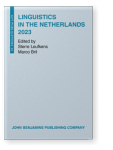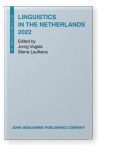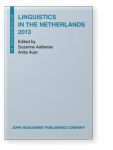Ferdy Hubers
List of John Benjamins publications for which Ferdy Hubers plays a role.
2023 On the acceptability of the not so dummy auxiliary ‘do’ in Dutch Linguistics in the Netherlands 2023, Leufkens, Sterre and Marco Bril (eds.), pp. 210–229 | Article
The auxiliary doen ‘do’ in standard Dutch is usually described as ‘dummy’ because it supposedly adds nothing substantial to the meaning of the sentence. We argue, however, that the auxiliary does have a function in the sentence, as a marker of either habitual or intentional aspect. In an online… read more
2022 Variation in the processing of grammatical norm violations: Between-participant and between-construction differences Linguistics in the Netherlands 2022, Vogels, Jorrig and Sterre Leufkens (eds.), pp. 21–38 | Article
So far, processing studies on grammatical norm violations (GNVs) in Dutch (i.e. als ‘as’ in comparatives) have mainly focused on general differences between GNVs and their grammatical and ungrammatical counterparts. The present study is the first to also systematically investigate… read more
2022 The use of the Dutch discourse particle eigenlijk by native and non-native speakers Linguistics in the Netherlands 2022, Vogels, Jorrig and Sterre Leufkens (eds.), pp. 174–191 | Article
In this paper, we investigate whether non-native speakers of Dutch use the interpersonal discourse particle eigenlijk differently than native speakers of Dutch. Particles such as eigenlijk are considered to be very difficult to learn for non-native speakers. Eigenlijk might be even more… read more
2013 The effect of prescriptivism on comparative markers in spoken Dutch Linguistics in the Netherlands 2013, Aalberse, Suzanne and Anita Auer (eds.), pp. 89–101 | Article
Dutch prescriptive grammar rules dictate that the complementizer dan ‘than’ should be used in comparative constructions of inequality. This has been an issue for grammarians from the sixteenth century onwards when als ‘as’ started to be used as an alternative form in this type of context. In order… read more


